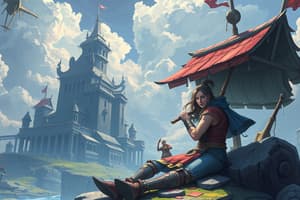Podcast
Questions and Answers
Skill as a game mechanic involves _____ skill, which the player must possess.
Skill as a game mechanic involves _____ skill, which the player must possess.
real
Games that focus on _____ often shift the emphasis away from the game itself and onto the player.
Games that focus on _____ often shift the emphasis away from the game itself and onto the player.
skill
Physical skill is critical in sports and involves strength, dexterity, and _____ .
Physical skill is critical in sports and involves strength, dexterity, and _____ .
coordination
In video games, _____ skill involves decision-making and problem-solving abilities.
In video games, _____ skill involves decision-making and problem-solving abilities.
Games that prioritize _____ skill might benefit from cooperative gameplay and reading opponents.
Games that prioritize _____ skill might benefit from cooperative gameplay and reading opponents.
Too much emphasis on _____ skill can limit a game's accessibility.
Too much emphasis on _____ skill can limit a game's accessibility.
_____ and chance are considered opposing forces in game design.
_____ and chance are considered opposing forces in game design.
Virtual skill can improve even if a player's _____ skill does not.
Virtual skill can improve even if a player's _____ skill does not.
Games of skill focus on determining who is the best among ______.
Games of skill focus on determining who is the best among ______.
Rolling dice is often considered less stressful than ______ a jump.
Rolling dice is often considered less stressful than ______ a jump.
To understand player preference, one must consider the target ______.
To understand player preference, one must consider the target ______.
In games, character/item gacha is an example of ______ whereas optimizing equipment is an example of skill.
In games, character/item gacha is an example of ______ whereas optimizing equipment is an example of skill.
Addictive game design requires players to face off against ______ or uncertainty.
Addictive game design requires players to face off against ______ or uncertainty.
Physical activity in games can include steering, throwing items, or pushing ______.
Physical activity in games can include steering, throwing items, or pushing ______.
Many games involve both strategizing and solving ______ simultaneously.
Many games involve both strategizing and solving ______ simultaneously.
Adding puzzle-solving elements may make the game more ______.
Adding puzzle-solving elements may make the game more ______.
Competition is related to social ______, while cooperation highlights diversity.
Competition is related to social ______, while cooperation highlights diversity.
Through social interaction, we learn who is good at what and how we can work together when we need to ______.
Through social interaction, we learn who is good at what and how we can work together when we need to ______.
Games provide a socially safe way to ______ and/or cooperate.
Games provide a socially safe way to ______ and/or cooperate.
If player skill is not fairly measured by the game, winning might not be something to be ______ of.
If player skill is not fairly measured by the game, winning might not be something to be ______ of.
Is there ______, or is there antergy?
Is there ______, or is there antergy?
Antergy results in players doing their own ______, but could make players consider changing their roles.
Antergy results in players doing their own ______, but could make players consider changing their roles.
Team competition provides opportunities for both ______ and cooperation.
Team competition provides opportunities for both ______ and cooperation.
Even if a game provides a wide variety of activities, game balance might force players to improve certain ______ in order to progress.
Even if a game provides a wide variety of activities, game balance might force players to improve certain ______ in order to progress.
_____ provides incentive to work as a team, but could force players into specific roles
_____ provides incentive to work as a team, but could force players into specific roles
_____ results in players doing their own thing, but could make players consider changing their roles
_____ results in players doing their own thing, but could make players consider changing their roles
Flashcards are hidden until you start studying
Study Notes
Player Skill Overview
- "In virtute sunt multi ascensus" - Cicero, emphasizes the idea of skill as a pathway to success.
- Video games typically prioritize skill over chance, diverging from many board and card games that rely heavily on luck.
- Player skill shifts focus from the game itself to the player's abilities.
Skill as a Game Mechanic
- Certain games require specific skill levels to advance, necessitating improvement ("git gud").
- Skill represents a critical gameplay element.
Categories of Skill
- Physical Skill: Involves strength, coordination, and endurance, vital in both sports and movement-based video games.
- Mental Skill: Encompasses decision-making, memory, and problem-solving, essential in nearly all game genres.
- Social Skill: Involves reading opponents, teamwork, and communication, contributing to strategic gameplay.
Real vs. Virtual Skill
- Real skill is essential for actual gameplay, while virtual skill pertains to the capabilities characters possess in-game.
- Balancing real and virtual skills is key for accessibility; too much focus on real skills may alienate casual players.
Skill and Chance Dynamics
- Skill and chance exist in opposition; an imbalance favors one over the other.
- Player preference influences game design; competitive games favor skill, while games of chance create a relaxing atmosphere.
- Hybrid mechanics can intertwine skill and chance, like card drawing (chance) coupled with strategy in gameplay (skill).
Balancing Gameplay Elements
- Successful game design cultivates engagement by blending real skill, chance, and strategic thinking.
- Understanding target audiences, including demographics and preferences, aids in balancing gameplay elements.
Head vs. Hands
- The balance between physical challenges (head) and cognitive tasks (hands) is crucial.
- Many games require simultaneous skill execution, blending strategic thinking with quick reflexes.
Competition vs. Cooperation
- Both competition and cooperation serve essential roles in gameplay, affecting social dynamics and player engagement.
- Games simulate social interactions where players learn to navigate competitive and cooperative scenarios safely.
Measuring Player Skill
- Effective games measure player skill accurately; discrepancies can diminish the value of victories.
- Communication and the requirement of teamwork can enhance gameplay experience, fostering interaction among players.
Balancing Competition and Cooperation
- Team dynamics can promote both individual skill enhancement and teamwork; the choice between competition types may alter player enjoyment.
- Game design may necessitate certain skills for progression, which can influence player experience and interaction.
Reminder
- Upcoming topics will focus on making player decisions engaging and impactful.
Studying That Suits You
Use AI to generate personalized quizzes and flashcards to suit your learning preferences.




